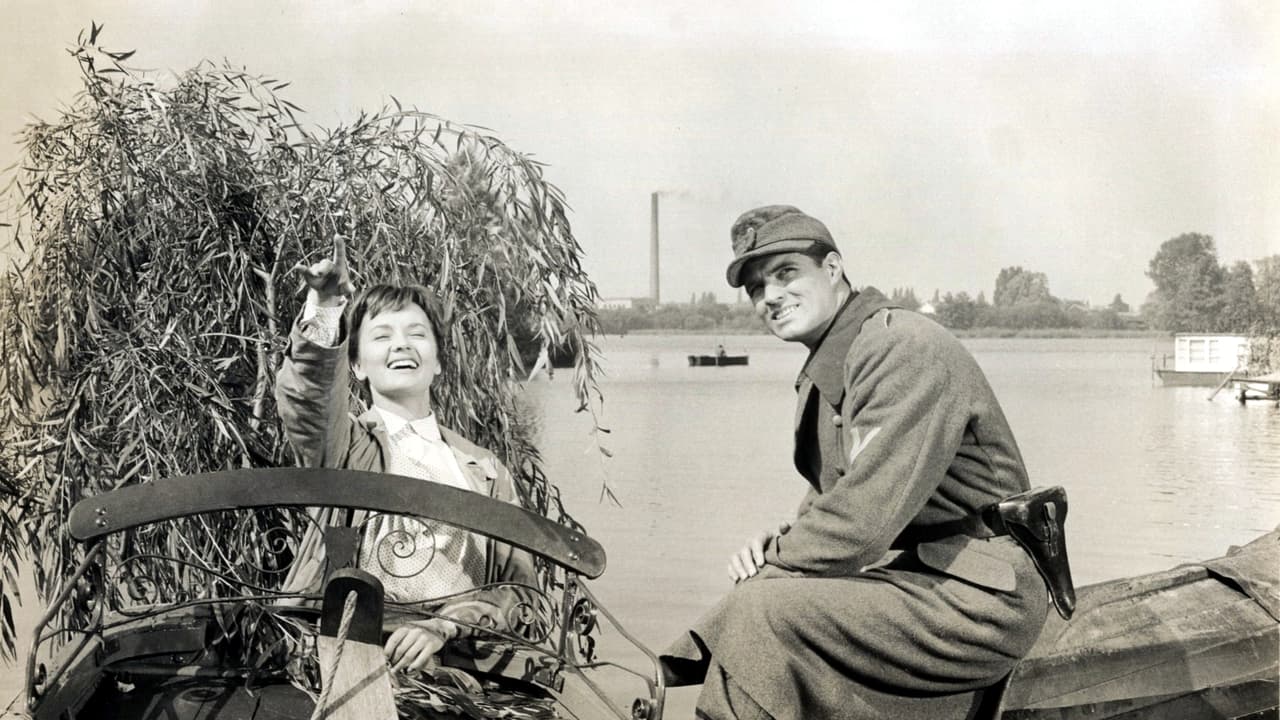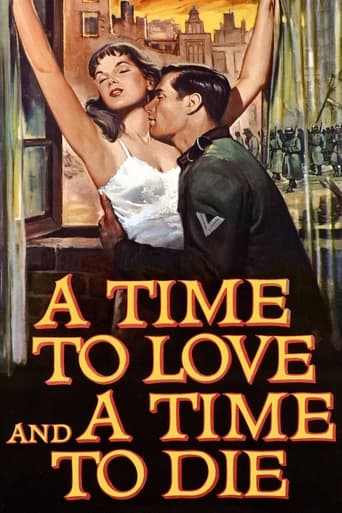

Whilst having read high praise of his creations for years,I somehow have never got round to seeing a title by auteur director Douglas Sirk. Checking with my dad about what he has recently sold on eBay,he mentioned a Sirk DVD that was about to be sent,and asked me if I would like to watch it before it goes,which led to me putting some time aside for A Time to Love and a Time to Die.View on the film:Filming in Germany for the first time since fleeing from the Nazis,auteur director Douglas Sirk & cinematographer Russell Metty superbly use the lush beauty of Sirk's Technicolor stylisation to starkly show the devastation of war. Unable to work in the Soviet-controlled part of the country, Sirk and the crew reinforce bombed out buildings and build entrances,exits and stairways within them, giving the scenes of Graeber and other soldiers lifting bricks to find survivors of the latest air raid bombing an earthy atmosphere. Ending on a haunting image possibly referencing the death of his son Klaus Detlef Sierck, (Sirk's ex-wife Lydia Brincken Joined the Nazis and got Klaus to become a child star in Nazi propaganda films,along with barring Sirk from seeing Klaus after Sirk married Jewish actress Hilde Jary. Klaus died as a solider on the then-USSR Ukrainian boarder on 22 May 1944) Sirk and Metty contrast the autumn colours of Ernst Graeber and Elizabeth's romance with an uncomfortable, threatening mood,lit in the casual manner the Nazis sit back and tell Ernst of the latest people they have sent to the concentration camps,brilliantly underlined by a shimmering score from Miklós Rózsa.Giving his own seal of approval by co-staring in the adaptation of his own book,Orin Jannings take on Erich Maria Remarque's novel takes an intelligent, novel-like approach to Elizabeth and Ernst's romance, starting from a collage of them piecing each others common interests with flirting and tempting asides, to a blossoming romance held by them each willing to risk their lives for the others safety. Hardly featuring any signs of the Allies, Jannings goes behind enemy lines and follows those trapped inside Nazi Germany, where Ernst's time on the battleground has made him well aware of the threat loyal Nazi solders and informants hold towards murdering the Jewish Elizabeth and him.Appearing in the first of two films for Sirk,John Gavin gives an incredible performance as Ernst,whose romantic side is pinned by Gavin with a quick-witted edge to search for his parents out of sight, and to keep Elizabeth out of the Nazis grip. Looking absolutely beautiful from her first appearance, Liselotte Pulver gives a magnificent performance as Elizabeth,via bringing a real delicate touch to the early stages of the romance,that transforms into a burning passion for Ernst and Elizabeth's desire to fight to make this a time to love.
... View MoreDouglas Sirk's excellent war drama is unfortunately not as well-known as his luridly coloured 50's melodramas "Written On The Wind, "All That Heaven Allows" etc. That's too bad, because it deserves to be, and is one of the best films of it's type. It tells a harrowing, yet hopeful story. The German Army is crumbling in 1944, when war weary John Gavin (suprisingly good) is granted furlough. Hope comes to him through falling in love with a charming girl, Lilo Pulver, whom he kisses by the emerging blossoms next to the river. They marry, and enjoy whatever happiness they can. They revel in it, as you you do, but a gloom hangs over the film. This is also represented by the colour scheme employed by Sirk. Instead of the bright 'Scope of WOTW or ATHA here we have slate greys and smoky blues. His use of mis en scene here is also kind of remarkable, with the grotesque German officer who Gavin visits having what seem to be hundreds of dead trophy animals adorning his walls. Memento's of the dead, perhaps? Remarque wrote the novel, and also appears in the film. Challenging, moving and heartbreaking, with an ending that shocks and angers, yet is also justified.
... View MoreMelodrama maestro, Douglas Sirk, ditches the Technicolor gaudiness of his 1950s weepies for romance set against the grim backdrop of death and destruction with "A Time To Love And A Time To Die". Yes, many of Sirk's familiar touches are here. But this is not a carbon copy of his hit soap operas. This film is affecting, if overly-long, with two surprisingly good leads in the impossibly handsome John Gavin and the lovely Lilo Pulver. Sirk does gloss up the devastation of war a bit; however, Sirk does allow this movie to have its share of shockingly frank and disturbing moments.John Gavin plays German soldier, Ernst, who returns to his hometown on furlough. What he finds are the tattered remains of his home and goes on a search for his missing parents. During his frantic search, Gavin meets a childhood acquaintance. Among the air raids, bombings and sheer terror, they develop a romance and marry. Knowing that their time together will be short, they milk every moment for what it's worth before inevitable tragedy destroys their romance.Gavin who was cast more frequently for his good looks than his acting chops actually makes a passable lead this time, although his playing a German is a little bit of a stretch. While this is not Douglas Sirk at his finest, it is an interesting project that capitalizes on the popularity of war films while also allowing Sirk to immerse himself in a topic that comes straight from his own past.
... View MoreI saw this fabulous tear-jerker purely by accident but I don't regret it one bit. In my opinion it's one of the best romantic war films ever made. This is mainly because the fabulous director Douglas Sirk doesn't allow it to become a soppy schmaltz. Also, the film is incredibly moving, especially in a scene at the beginning where a young man, unable to live with the guilt of having shot a woman, shoots himself. John Gavin is good as Ernst Graeber and his beloved is adequately played by Liselotte Pulver, but the most outstanding performance, I think, is by Charles Régnier as Joseph. If more war films were made like this then they would be much, much more watchable. The credit sequence at the beginning of the film is also very well done. Why don't more people know this masterpiece? Enjoy! (and don't forget the Kleenex) 10/10
... View More